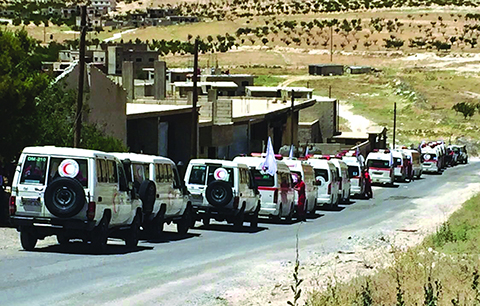 This Monday, July 31, 2017 photo released by the government-controlled Syrian Central Military Media, shows ambulances of the Syrian Arab Red Crescent gathering in the Syrian border village of Fleeta. - AP
This Monday, July 31, 2017 photo released by the government-controlled Syrian Central Military Media, shows ambulances of the Syrian Arab Red Crescent gathering in the Syrian border village of Fleeta. - APBEIRUT: Scores of buses and ambulances arrived at the Lebanon-Syria border yesterday for the second phase of an exchange between Lebanon's militant Hezbollah group and Syria's Al-Qaeda affiliate that would lead to the resettlement of thousands of refugees in Syria. It was not immediately clear if the evacuation will go ahead as scheduled, or will be delayed, because the registration of thousands of Syrians who want to return home is taking longer than expected.
The evacuation deal followed a military offensive by Hezbollah fighters and Syrian troops during which they captured border areas between the two countries and left hundreds of Al-Qaeda fighters besieged in a small rugged mountainous area. The fighting ended with a cease-fire Thursday for negotiations to allow refugees, fighters, and family members to leave to Syria's northwest Idlib province and the central Qalamoun region.
As part of the deal, the two groups on Sunday exchanged the bodies of their dead fighters. Hezbollah handed over the bodies of nine al-Qaida fighters in exchange for the bodies of five of its own. Under the second phase, about 9,000 Syrians, including hundreds of al-Qaida fighters, are to return to Syria. In exchange, eight Hezbollah fighters held by Al-Qaeda's Syria affiliate, Fatah Al-Sham Front, will be returned home.
Also to be evacuated are members of the Levant People's Brigades rebel group whose members did not take part in last week's battles. Those fighters will head to the government-held town of Ruhaiba, about 50 kilometers northeast of the Syrian capital Damascus where they will benefit from an amnesty by the state and return to normal life, according to Hezbollah's Al-Manar TV.
Major difficulties
The government-controlled Syrian Central Military Media released video and photos of the buses and ambulances near the Lebanese border town of Arsal and the Syrian village of Fleeta preparing for the evacuations. SCMM said the convoy heading to Idlib will drive through the central province of Homs then to the northern province of Aleppo before reaching Idlib.
In the northern city of Raqqa, at least two people were killed when a mine planted by members of the Islamic State group exploded, Syrian opposition activists said. The explosion in Nazlet Shehadeh struck some people who were trying to flee violence in the city, said the Britain-based Syrian Observatory for Human Rights and the activist-run group Raqqa is Being Slaughtered Silently.
The US-backed Kurdish-led Syrian Democratic Forces have been on the offensive in the de facto capital of IS since June 6, capturing almost half of the city. Nearly two months of fighting have left hundreds of people dead and wounded. The international medical organization Médecins Sans Frontières, or Doctors Without Borders, said in a statement yesterday that sick and injured civilians within and outside Raqqa are facing major difficulties obtaining urgent life-saving medical due to the fighting.
"Patients tell us large numbers of sick and wounded people are trapped inside Raqqa city with little or no access to medical care and scant chance of escaping the city," said Vanessa Cramond, MSF medical coordinator for Turkey and north Syria.
The MSF statement said that since the SDF offensive began, its medical teams in northeast Syria have treated 415 patients from Raqqa and surrounding villages. Most patients are civilians with conflict-related injuries caused by bombs, land mines, unexploded ordnance, shrapnel and gunshot wounds, the statement said. The limited number of patients treated by MSF who managed to flee Raqqa city say that the only way to leave is by being smuggled out, causing dangerous delays in accessing urgent medical treatment. - AP










